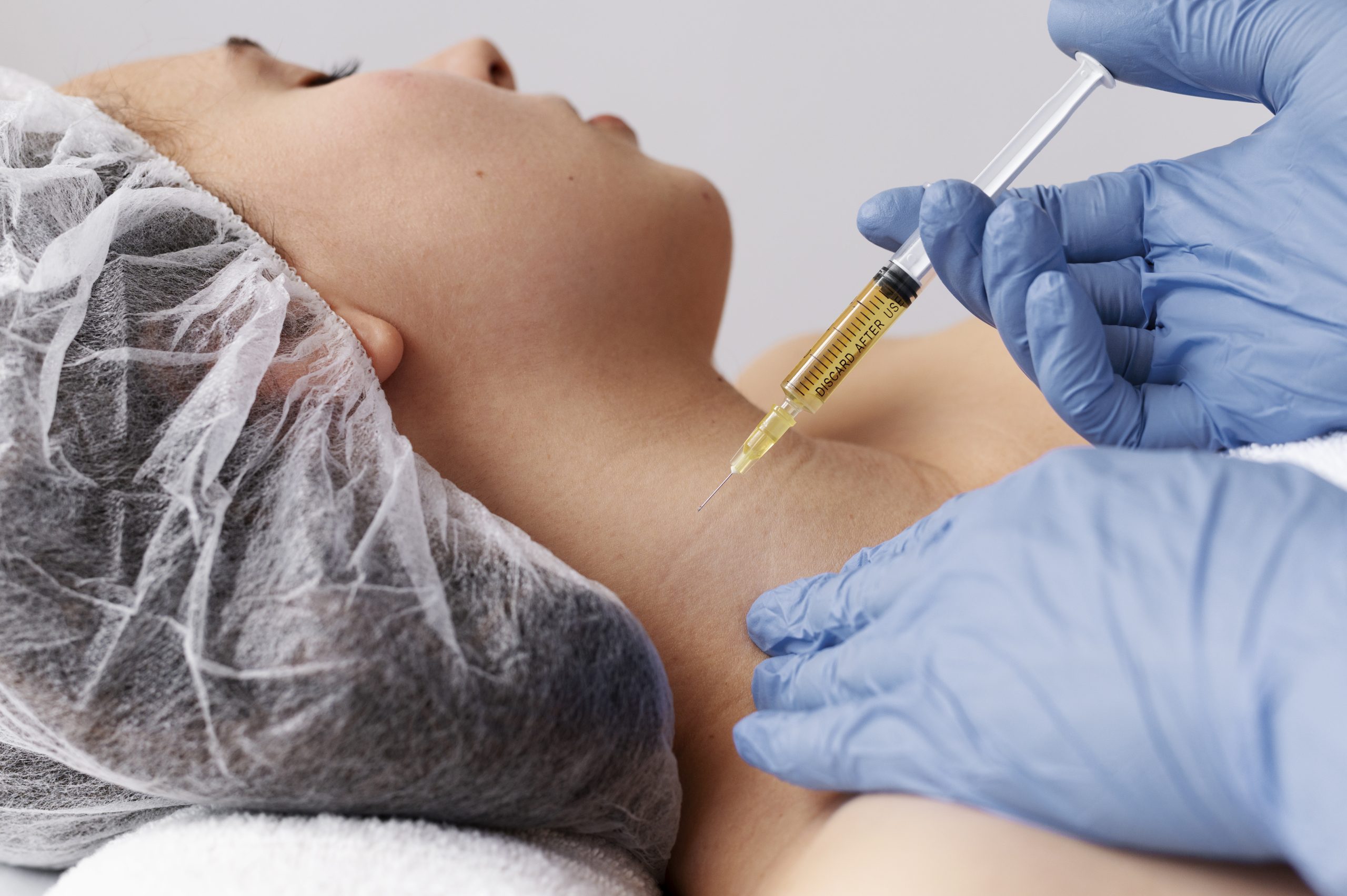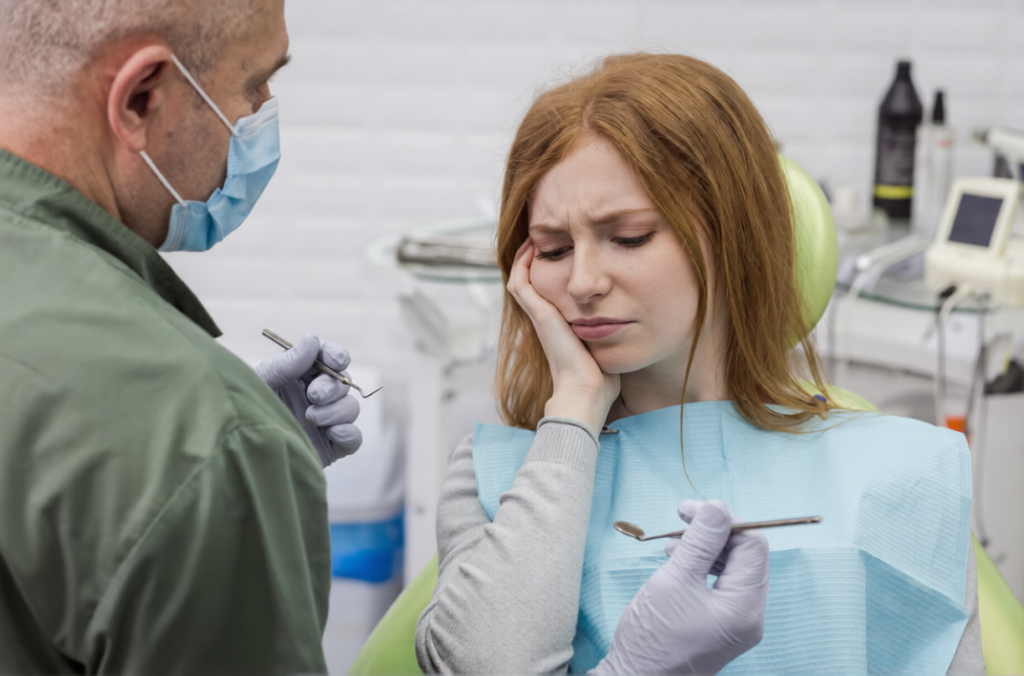If you’re considering TMJ injections, it’s natural to wonder about the recovery time for TMJ injections and how soon you can return to your daily activities. Recovery is different for each person. Some people may notice changes within a few days, while others may take weeks for the jaw pain and facial tension to ease. The timeline depends on the type of injection, the severity of TMJ symptoms, and individual healing responses.
In the first few days, mild soreness, swelling, or stiffness around the jaw is common. These short-term side effects usually settle as the body adjusts. Supportive steps—such as applying ice or heat, eating soft foods, or using over-the-counter pain relievers recommended by your healthcare provider—may improve comfort.
This article outlines the general recovery timeline, highlights factors that affect healing, and shares tips to help you feel prepared. Understanding the process enables you to recognise when comfort improves, know when to seek help, and learn how to support long-term jaw function.
- Recovery time for TMJ injections varies. Some people recover in just a few days, while others may need a couple of weeks before they feel comfortable again.
- In the first 24 hours, mild soreness, swelling, or stiffness can occur at the injection site. These short-term effects usually ease with rest.
- Over the coming days, some patients may experience reduced facial pain and improved jaw function, although the timing of these improvements varies between people.
- Improvements often continue over several weeks. In some cases, benefits may last months, depending on the type of injection used.
- Recovery outcomes are shaped by injection type, severity of TMJ disorder, overall health, and adherence to aftercare advice.
- Supportive steps such as eating soft foods, cutting food into smaller pieces, reducing jaw overuse, and practising stress reduction can help support recovery.
- Professional advice is essential if symptoms worsen, new concerns develop, or jaw movement remains limited.
Temporomandibular Joint (TMJ) Injections and Their Purpose
TMJ injections are one treatment option for managing jaw pain, headaches, and tension linked to the temporomandibular joint, which connects the mandible to the skull. Injections are often considered when conservative management, such as splints, medications, physical therapy, or stress reduction, has not provided enough relief.
Different substances may be used:
- Corticosteroids are sometimes used to target inflammation in the joint.
- Botulinum toxin can reduce overactivity in specific muscles by blocking nerve signals involved in clenching or grinding.
- Hyaluronic acid can be used to lubricate the joints and improve joint movement.
A dentist will consider your clinical findings, diagnosis, and history of other procedures before recommending injections. TMJ injections are not standalone but may form part of a broader plan that could include physiotherapy, jaw exercises, or ongoing care.
Typical TMJ Injection Recovery Timeline
Recovery after TMJ injections can differ between patients. The timeline below is a general guide only. Some people recover quickly, while others may take longer depending on their individual needs, the type of injection, and other contributing factors.
| Phase | What You May Experience |
|---|---|
| First 24 Hours | Mild discomfort, tenderness, or swelling at the injection site is a common occurrence. Stiffness in the jaw muscles may occur. Following aftercare advice, such as resting the jaw, can help. |
| One to Three Days | Temporary side effects may peak during this time and then gradually improve. Pain relief is not always immediate, especially with botulinum toxin injections. |
| One to Two Weeks | Some people may notice reduced TMJ discomfort and more effortless jaw movement during this stage, although the timing and degree of improvement vary widely. |
| One Month and Beyond | Benefits may continue to build, with effects lasting several months in some cases. A healthcare provider may suggest follow-up or additional TMJ treatment if needed. |
First 24 Hours
Some people may experience mild soreness, swelling, or temporary stiffness at the injection site on the first day after TMJ injections. The jaw muscles may feel slightly tight, and there may be tenderness when opening the mouth or chewing. These short-term effects are part of the body’s natural adjustment process and typically subside over time.
Following the aftercare advice from your healthcare provider is especially important in this stage of recovery. Simple steps, such as resting the jaw, avoiding hard foods, and maintaining an upright posture, can help support comfort and reduce pressure on the joint. Your care plan may also recommend a cold compress to alleviate swelling during this phase.
Knowing what may occur in the first 24 hours helps set realistic expectations about the recovery time for TMJ injections. Supportive measures can also make recovery more comfortable.
One to Three Days Post-Injection
In the first few days, temporary side effects may peak before they begin to settle. Some people notice tenderness, swelling, or mild bruising near the injection site. These symptoms usually improve gradually as the body adjusts.
Pain relief is not always immediate. For example, botulinum toxin injections may take several days before the jaw muscles respond. This means that while discomfort may begin to ease, noticeable changes can take longer, and the recovery timeline varies from person to person.
Gentle jaw care during this stage can help. To reduce strain, avoid chewing gum, biting nails, or eating large, tough foods. Following the aftercare guidance from your healthcare provider plays a crucial role in achieving comfort and reducing overall recovery time after TMJ injections.
One to Two Weeks
Some people may begin to notice gradual changes in jaw comfort, muscle tension, and movement when chewing or speaking between the first and second week. However, the exact recovery time for TMJ injections differs for each person.
The type of injection can influence this stage. Corticosteroid injections may reduce inflammation more quickly, while botulinum toxin injections often take longer to show results, as they gradually affect muscle activity over time. Some people may notice progress during this time, while others may require an additional week or two before experiencing noticeable relief.
Continuing with aftercare is essential. Eating smaller bites of food, avoiding gum chewing and nail biting, and using stress-reduction techniques can support healing and reduce strain on the jaw.
One Month and Beyond
Some people may notice more lasting changes in jaw comfort and muscle relaxation by one month and beyond. These effects can sometimes persist for several months, although the exact recovery time for TMJ injections varies from patient to patient.
The type of injection influences how long the results may last. Corticosteroid injections may ease inflammation, while botulinum toxin injections can take longer to show full effects but may provide relief for several months once active. Follow-up injections or additional TMJ treatments may be recommended for some people, depending on their clinical needs.
Regular aftercare, including maintaining healthy jaw habits and reducing stress, can support longer-lasting comfort. Your healthcare provider will guide you on whether ongoing treatment or review appointments are appropriate for your situation.
Key Factors That Can Influence Recovery Time

Recovery following TMJ injections is highly individual. Your body’s response to TMJ injections depends on several factors, resulting in significant variations in recovery time among patients.
Type of Injection Used
The substance used in the injection plays a role. Corticosteroid injections are sometimes used to address inflammation and may provide relief sooner. Botulinum toxin injections often take longer to show results, as they gradually reduce muscle activity over time. In some cases, hyaluronic acid may be recommended to improve joint lubrication, which can affect the duration of the results.
Severity of TMJ Disorder
The severity of TMJ dysfunction or muscle overactivity can influence recovery. People with long-standing or more advanced symptoms may take longer to notice relief. Sometimes, multiple sessions may be suggested as part of a broader TMJ management plan.
Overall Health and Healing Response
Your overall health has a significant impact on how well your body heals. Chronic stress, fatigue, or ongoing inflammation may slow recovery. Lifestyle factors, including smoking or heavy alcohol use, can also reduce the body’s ability to heal effectively.
Adherence to Aftercare Guidelines
Recovery is often smoother when aftercare instructions are followed carefully. These may include eating softer foods, avoiding strenuous jaw movements, and maintaining an upright posture after the procedure. Failure to follow these instructions may delay healing or increase discomfort.
Jaw Activity and Bruxism Habits
Excessive jaw use can slow recovery. Habits such as gum chewing, nail biting, or taking large bites of food can place extra pressure on the jaw joint. Clenching or teeth grinding may also reduce the effectiveness of injections by keeping the muscles in a state of tension.
You should always discuss recovery expectations with a qualified dentist, as these factors vary from person to person. They can assess your situation, recommend strategies such as oral splints or jaw exercises, and provide guidance tailored to your needs.
Aftercare Tips for a Smoother Recovery
While recovery looks different for everyone, there are simple, non-therapeutic steps that may help support comfort in the days following TMJ injections:
- Use a cold compress to ease swelling if your healthcare provider recommends it.
- Choose softer foods and cut them into smaller pieces during the first few days to reduce the pressure on the jaw joint.
- Avoid heavy chewing, gum chewing, or jaw clenching to give the facial muscles time to relax.
- Practise stress reduction techniques such as deep breathing or gentle stretching to help reduce unnecessary muscle tension.
- Follow up with your healthcare provider as recommended to monitor progress and discuss next steps if needed.
These tips are general in nature and should not be used as a substitute for professional advice. Recovery expectations and aftercare should always be tailored to individual needs and discussed with a qualified dentist or healthcare provider.
When to Contact Your Dentist
Most people do not experience complications after TMJ injections, but outcomes vary. Understanding when to seek professional advice is crucial. You should contact your dentist or healthcare provider if you notice any of the following symptoms:
- Increasing pain, swelling, or redness around the injection site
- Unusual bruising, persistent numbness, or tingling sensations
- Limited jaw movement or difficulty chewing that lasts longer than expected
- Signs of infection, such as warmth, discharge, or fever
While not everyone anticipates these issues, it’s crucial to review them if they arise. Healing timelines can vary significantly, and only a qualified dental professional can assess your situation and determine whether further care is necessary.
Understanding these signs is crucial for managing recovery time after TMJ injections, and receiving support when needed is essential.
Final Thoughts
Recovery from TMJ injections does not follow the same path for everyone. While some people may notice changes within days, others may take several weeks before feeling the full benefits. The type of injection, individual healing response, and everyday habits all play a role in how recovery unfolds.
What matters most is staying mindful of how your body responds and following the aftercare advice given by your healthcare provider. If symptoms seem unusual, persist longer than expected, or cause concern, a professional review can help guide the next steps.
If you’re thinking about TMJ injections, My Dentist Blackwood can guide you through your options. Our team will help you understand the potential benefits, risks, and alternatives so you can make an informed choice about your care.














